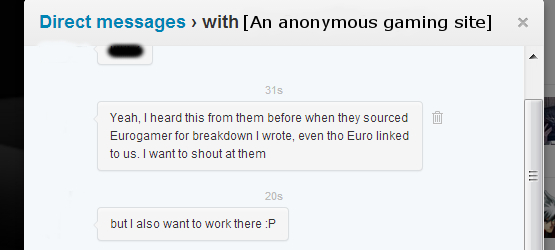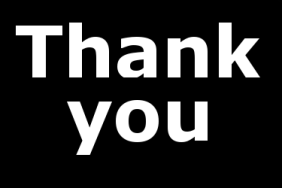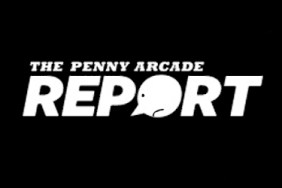Editor’s Letter is a series of ongoing articles on the state of PSLS, its future and the future of the industry as a whole.
It’s not fun writing these letters, they make me no friends in the industry and it’s hard not to come off as petty. But, at this point, I’m at a stage where if I didn’t have a position at somewhere I was proud of, and was forced to work freelance, I’d pull a Phil Fish and just leave the industry, it’s just too diseased.
Thankfully, there are days like today where I feel vindicated in my actions, no matter how career destroying they are.
This morning, at around 8am, I was preparing to go to sleep. It had been a good day, with the publication of a scoop of mine (and a few of Jason’s) ensuring we had quality, unique content. On a whim, I checked who else had covered my story, and noticed something was awry. After a very public Twitter argument over the matter, I went to bed. When I awoke a few hours later, my inbox was inundated with messages from equally-wronged journalists.
Before I go on and explain what happened, let me backtrack a little. If you’ve read my depressingly numerous articles on games journalism you know about the importance of sites correctly sourcing and crediting each other already. But, for any new readers, and to educate anyone from VG247 that happens to be reading, let me give you a quick, concise explanation (get a deeper rundown here):
- Sourcing and credit is where one site links to another for one of two reasons – either the information needed for the article is found on the original site (like in an interview), or the original site found the information elsewhere and you want to give them credit (like with a job posting).
- This is the standard, recognized way media outlets credit each other, even before the internet existed. Journalism 101. The idea is that, if you keep seeing a publication’s name breaking news, you might be drawn to it. Therefore, every publication has to strive to break news, pushing the industry to greater and greater heights.
- Now that the internet does exist, correct sourcing has become even more important. It’s no longer about the ‘namecheck’, it’s about linkage. The majority of traffic comes from Google, and one of the ways Google decides a site’s rank is by looking at the amount of times it has been linked. Therefore, every publication should strive to break news, so that they get linked and the site can survive/grow, pushing the industry to greater and greater heights.
- However, that all falls apart when outlets don’t correctly source, meaning that there’s little incentive to actually try to break news, pushing the industry to deeper and deeper depths.
One example of a scoop is yesterday’s ‘Bluepoint Bringing a “Sony Classic” to Current Gen’ post we broke. It’s not the biggest story in the world, but a surprisingly large amount of effort, time and energy went into uncovering it – I had to read hundreds of ultimately fruitless job posts from countless developers all over the internet, before I found the story. Now here’s the problem – if I worked freelance, or were paid-per-hit, I wouldn’t have been able to invest that much time into a relatively small story, as it’s almost a given that sites won’t correctly link to it. Instead, it would have been better to regurgitate 10 press release posts in the same timeframe. Even as it is, I still have to sacrifice my ‘scoop hunting’ time more and more, and now end up doing that during times I should be sleeping/eating/going outside.
That’s why I was annoyed when VG247 credited the folks at Gematsu for the scoop. But, I didn’t think it was a massive deal, certainly not one worthy of an article denouncing the move, as it seemed like it was a mistake, which can easily be made when someone is trying to pump out news. So, I politely contacted the writer of the post, Brenna Hillier, and explained how you could tell we were the original source because Gematsu had credited us (thanks, you guys are awesome). What followed was one of the most bizarre and confusing conversations of my career.
Brenna explained to me that VG247 credit the first place they read an article (something that disproportionately favors their parent site, Eurogamer), regardless of whether that site happens to have had any input into finding said scoop. This, in turn, makes it harder for other sites to ascertain the correct source, meaning that the correct credit isn’t given. After a short, mostly one-sided, discussion into the ethics of their move, she replied:
@SebMoss we have different policies. I’d prefer not to keep discussing this. Thanks for sharing your thoughts with me.
And, because she doesn’t want to continue discussing something integral to the quality of games journalism, I’ll do it here.
After our discussion, I started being Direct Messaged by other journalists – nine to be precise – who had seen the conversation (and those are just the people that are following both of us and were on Twitter at the time). Each one told me a similar story, about how a ‘policy’ had stopped them being correctly sourced for their hard work. I asked some of them to come forward, but the reply was always the same: ‘no, I don’t want to cause trouble, don’t quote me’. The Eurogamer network – which includes Eurogamer, VG247, ‘Rock, Paper, Shotgun’, USGamer, GI.biz and five others – is a powerhouse in the industry. They hire a significant amount of journalists, both full time and freelance, so nobody wants to call them on an outright damaging policy, one that willfully makes the industry worse.
I reached out to a few more journalists, as well as some ex- and current employees of VG247 to get a fuller picture. On the outside, the story was always a resigned acceptance of how that was the way the bigger site did things, and that nothing could be done. One writer told me, under condition of anonymity “VG247’s ‘policy’ does my head in on an almost daily basis. I share your frustration”, another “it happens all the time”, and yet another saying “that’s [VG247] for you”.
Meanwhile, the inside story was one of little oversight, and no concern for doing what is right. Nobody at the publication cares who is sourced or credited, I was told.
People wonder why games journalists rely so heavily on press releases and NeoGAF. This is why. People wonder why so much of games journalism is awful. This is why.
People wonder why I write these letters.

This is why.








